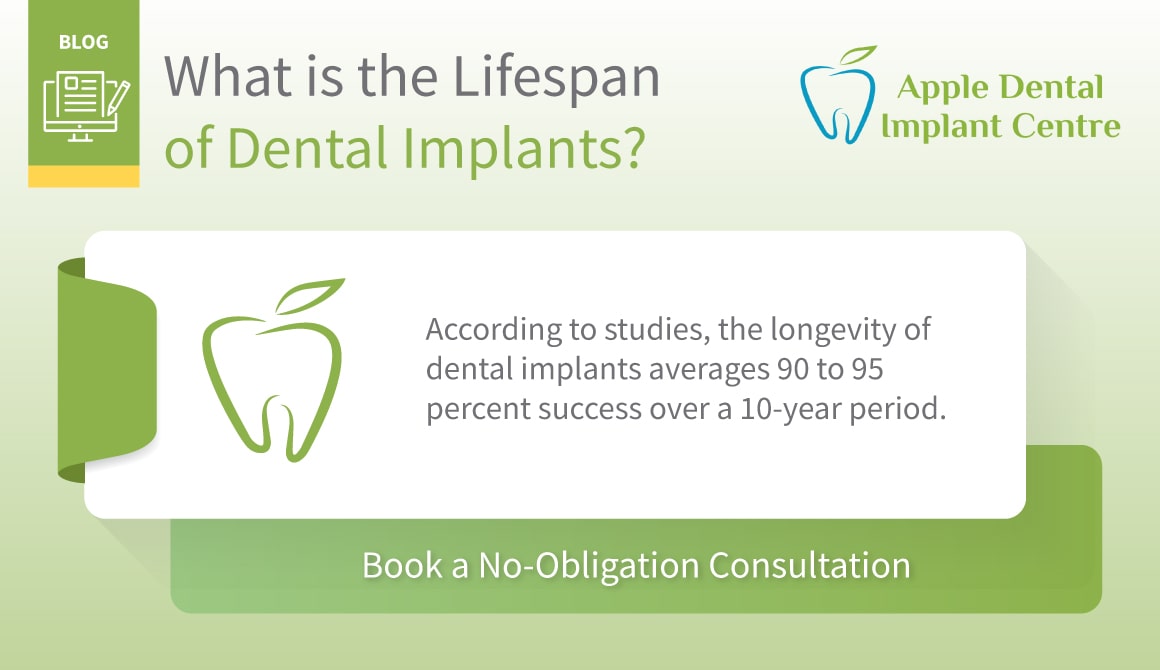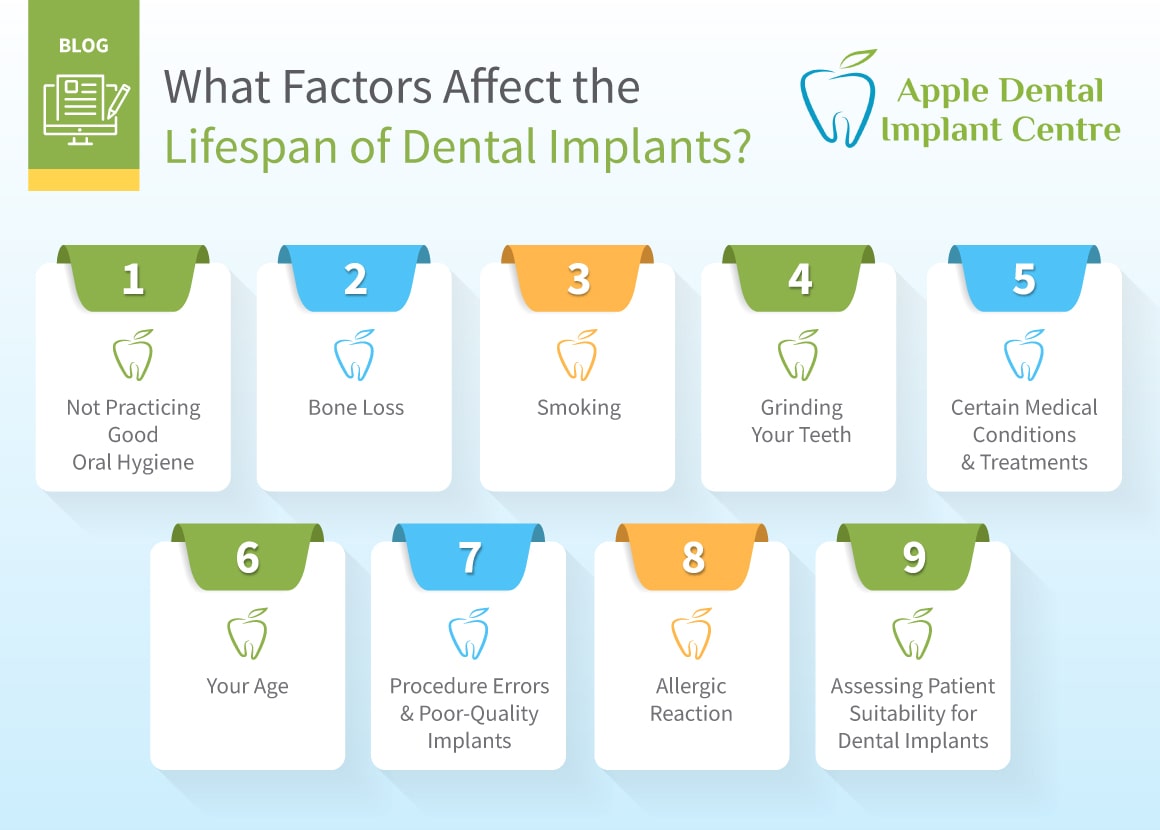Share this
Dental Implant Lifespan: How Long Do Implants Last For?
by Apple Dental Implant Centre on (March 01, 2023)
Dental implants provide the ideal tooth replacement solution. Because the crown is secured using posts inserted into your jawbone, they offer a very realistic look and feel. Implants function exactly like your natural teeth roots and fuse to the bone. While implants are considered a “permanent” tooth replacement solution, typically lasting three times longer than dentures, there are several factors that impact how long they will actually last.
Here we look at how long implants last, the different types of dental implants, and factors that impact longevity. But as any trusted specialist should, we also explain some potential drawbacks, treatments to remedy them, and tips to increase the likelihood of having a successful dental implant experience.
Do Dental Implants Last Forever?
While saying that nothing great lasts forever may be true, dental implants come awfully close. When the procedure goes as planned, this natural process secures the posts to the jaw. The crown material is strong and highly resilient, and implants fit securely like real teeth. As long as you don’t have an underlying medical condition and are able to avoid unfortunate accidents, the implant itself can last forever, and the crown has a lifespan of 15 to 20 years.

What is the Lifespan of Dental Implants?
According to studies, the longevity of dental implants averages 90 to 95 percent success over a 10-year period. This means that when you have a dental implant procedure, you have a very high likelihood of being able to enjoy life to the fullest as if you never lost the tooth or teeth in the first place. In the event that issues with your implants do occur, we can provide you with a solution that will make it right.
We’re always available for no-obligation consultations to get the process started.

What Factors Affect the Lifespan of Dental Implants?
A touching song, great book, or those last few minutes of sleep before the alarm goes off are all things we wish would last forever, but they never do. Your dental implants are designed to be with you forever, but there are a handful of factors that can influence their longevity. At Apple Dental Implant Centre, we will explain potential risks during your no-obligation consultation. Here are some factors that can affect your dental implant lifespan:
Not Practicing Good Oral Hygiene
As with your natural teeth, if you fail to follow a healthy dental regime, your oral health can suffer, impacting your implants. This is why it’s always a good idea to follow a consistent oral hygiene routine that includes:
- Brushing twice daily
- Flossing daily
- Reducing sugar intake
- Scheduling two dental checkups a year
Bone Loss
As mentioned, dental implants are inserted into your jawbone. If you suffer from bone loss, your implants may not be optimally supported, which can lead to issues that will affect the effectiveness of the implants. If you’re unsure if bone loss could possibly affect your dental implant lifespan or procedure, contact the specialists at Apple Dental Implant Centre today for a no-obligation consultation.
Smoking
Smoking increases the risk of having issues with your dental implants because it impacts blood flow which can interfere with healing and osteointegration.
Grinding Your Teeth
Teeth grinding causes trauma from constant pressure, which can damage the structure of your dental implant. Grinding your teeth can also interfere with the healing process, so try to be aware when you’re awake and get in touch with us if you grind your teeth at night to explore your options.
Certain Medical Conditions & Treatments
Medical conditions and treatments can affect so many different things, and it’s always a good idea to get in touch with us to discuss your concerns if any of the following scenarios are true for you:
- Diabetes
- Osteoporosis
- A weakened immune system
- Bleeding disorders
- High blood pressure
- Atherosclerosis
- Congestive heart failure
- Immunosuppressive drugs
- Blood-thinning medications
- Radiation therapy
Your Age
While it’s true that older patients have an increased likelihood of running into problems, that doesn’t mean you aren’t eligible if you are older. Just schedule a no-obligation consultation with our team and we will go over all the possible risk factors with you to help ensure dental implants are the right choice for you.
Procedure Errors & Poor-Quality Implants
An inexperienced dental surgeon can make mistakes that lead to problems. Common issues include improper placement or failure to wait until the posts have completed the healing and osseointegration process. The use of sub-standard implant materials can also interfere with the bone-fusing process. Using a trusted implant specialist like Apple Dental Implant Centre ensures all best practices are followed. Schedule a no-obligation consultation with us today to learn more.
Allergic Reaction
It is possible to experience an allergic reaction to the titanium alloy material used for the posts. Signs you are allergic to your implants include:
- Swelling
- Tingling
- Loss of taste
If you are aware you have a titanium allergy, get in touch with us so we can go over your options and recommend an alternate type of post.
Assessing Patient Suitability for Dental Implants
Ideal candidates for dental implants have good oral and general health and no signs of gum disease. You also require a healthy, adequate jawbone to support the implant posts. If you’re not sure if you’re a good candidate based on this criteria, get in touch with us for a no-obligation consultation.
Do Different Types of Implants Have Various Lifespans?
The types of implants available include single, multiple, and All-On-4®. Lifespan is not as reliant on the type of implant as much as it is on the position of the missing tooth.
Types of Implants
First, let’s look at the types of implants:
- Single implants: Single implants are used to support a single crown for a single missing tooth.
- Multiple implants: Multiple implants are used to replace several teeth and can include a series of single implants in different areas of the mouth, implant-fixed partial dentures (implant bridges), a removable partial denture (RPD), or with a conventional set partial denture (FPD).
- All-On-4®: Also known as full mouth implants, All-On-4® implants are used when you are either missing all your teeth or the remaining teeth must be extracted due to severe damage. You can choose between permanent implants, fully detachable dentures, and dental implant-supported fixed bridges.
Position of Implants
The position of your implants has more impact on lifespan than the type of implant. Over a 12-year period, upper implants have an 84 percent success rate compared to lower implants at 93 percent. As a comparison, dentures have a reported failure rate of almost 40% and dental bridges may have to be replaced every 5 to 10 years. It’s also important to note that dental implants are the only option for tooth replacement that can help prevent bone loss and stimulate bone growth.
What Happens If a Dental Implant Fails?
In the rare case that your dental implant fails, your dentist will review the symptoms and work toward finding a solution. Some of the signs to watch for include:
- Difficulty chewing
- Inflamed gums
- Receding gums
- Swelling and/or redness
- Pus
- Loose implant or crown
- Pain and discomfort not resolved with over-the-counter pain medication
Treatments
If you experience any of these symptoms, let your dentist know as soon as possible. They will assess your implants and recommend treatments that may include removing the implant, replacement, bone grafting, and others. The key is to take action as soon as you notice any signs of trouble, so a solution can be found as soon as possible.
Preventing Dental Implant Issues
To keep your dental implants in good condition and continue the healing process, it is very important to follow your dentist’s post-care instructions to a tee. The recommended tips include:
- Following instructions on proper brushing and flossing
- Using mouthwash to keep the area clear of debris and to help fight bacteria
- Scheduling your six-month dental checkups
- Quitting smoking
- Getting enough calcium to promote bone strength and health
- Wearing a nightguard if you are prone to teeth grinding
- Avoiding chewing hard foods and ice, using your teeth as a tool to open packages, and biting your nails if you have implants at the front of the mouth
Should I Consult an Expert?
Yes, it is always best to consult with an expert when considering any form of dental treatment. If you would like to discuss the possibility of having dental implants, a consultation is the most direct route to information and treatment. A consultation will also review the pros and cons of dental implants and whether you have common risks affecting the longevity of dental implants.
The specialists at Apple Dental Implant Centre are ready to answer your questions and discuss your tooth replacement treatment. Click here to schedule your no-obligation free consultation today, or find an Apple Dental Implant Centre near you.

